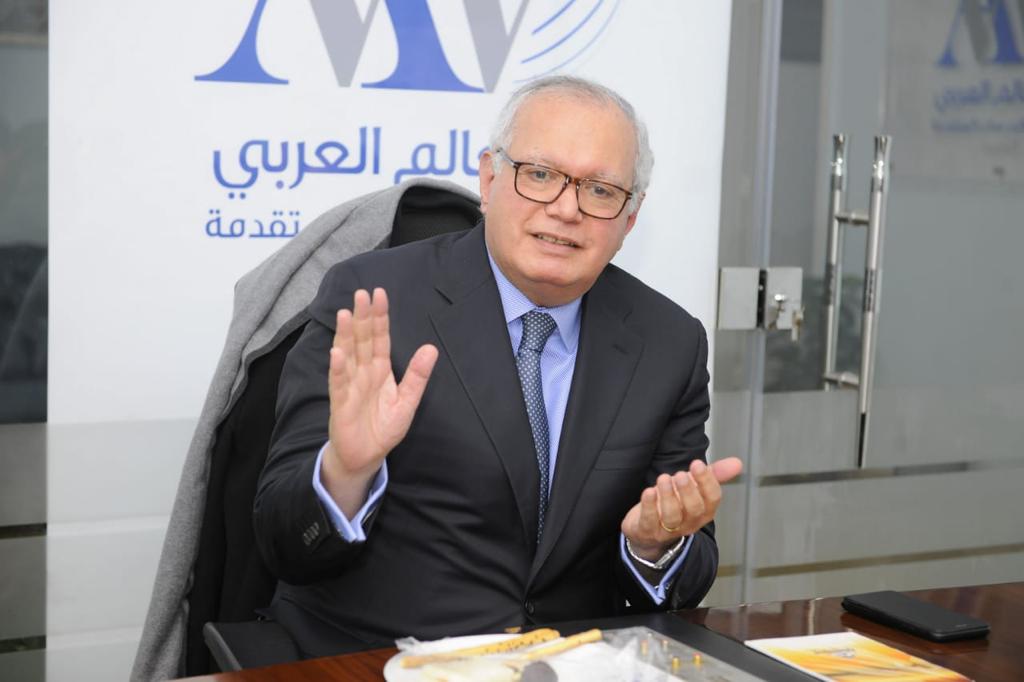On 18 January, 2022, The Arab World Centre for Research and Advanced Studies organized a panel discussion on why armed conflict resolution is faltering in the Arab region. The keynote speaker was former Egyptian Minister for Foreign Affairs, Ambassador Mohamed Al-Arabi. Panelists included a number of experts and researchers including Dr. Mohamed Ezz al-Arab, Dr. Mohamed Abbas Nagi, Mr Ahmed Aliba, Mr Amr Abdulaati, Dr. Hamdi Bashir, Mr Karam Saeed, Ms Mervat Zakaria and Mr Mohamed al-Fiqi.
Opening Remarks
Ambassador Al-Arabi outlined a number of factors affecting the armed conflict in Arab states, the most notable of which were:
Drastic international changes: In every decade, major events bring about changes that affect international relations, these include for example the collapse of the Berlin Wall, the September 11 attacks, the popular uprising in the Arab region in 2011, and, finally, the Covid-19 pandemic. All these events had consequences beyond the borders of the states in which they started. Over the next decade, the challenge to the modern state will be how to emerge from this high-turbulence environment intact, based primarily on its own resources.
A new Arab reality: The Arab region in the last decade has experienced drastic changes that were unimaginable before 2011. For example, who could have imagined the presence of so many armies in Syria, but this is a new reality in the region that makes it difficult to predict the resolution of Arab issues soon.
Prolonged crises: The most prominent feature of Arab crises is that they are intractable, without prospects of resolution in the near future given their complexity. For example, in Syria there are three countries on the ground (Iran, Russia, and Turkey) who have made gains they are unlikely to forgo. ISIS has also resumed its activities. On the other hand, there is a lack of Arab resolve to settle differences. Moreover, the region has become a testing field for an experimental UN approach that does not take into account the fragile nature of conditions on the ground, and the populations that are largely underprepared. This is the case in Libya and Syria where it is currently inconceivable to set up a constitution-writing committee.
Issues of concern
Ambassador Al-Arabi also spoke of some new and disturbing developments over the past years, some of which have complicated the political landscape in the Arab region. These include:
Continued attrition: The tumult of the past few years has resulted in a situation of continued attrition. There has been no attempt to generate solutions inspired by conditions on the ground. Moreover, without Arab participation, we are unlikely to arrive at solutions to the foundations of these problems, particularly in view of foreign intervention by states such as Iran, Turkey, Israel and Ethiopia. For instance, in a strategic leap, Turkey has overtly intervened in both Syria and Libya. The international community has not moved to stop this orientation on the part of President Erdoğan, nor to put obstacles in his way. The same applies to Iran’s interventions in Syria, Iraq, Yemen, and Lebanon.
Proliferation of military bases: Various states have moved to establish military bases in the Arab region. For example, Djibouti hosts military bases for China, France and the US. French special forces are also present. This trend is not only related to the control of Bab al-Mandeb, the entry way to the Red Sea, but the presence of these bases also has wider implications for Africa.
A strategic break for Israel: Israel has benefited from conflicts and crises in the Arab region and has entered what could be called a “strategic hiatus”, due to the decline in military power of Syria and Iraq. Israel’s last attempt at military intervention was in 2003, during the US strike on Iraq, but the US turned down Israeli participation. Israel has also benefitted from the normalization of relations with a number of Arab states lately, as well as from the reduced attention to the Palestinian question both regionally and internationally.
Transnational armed groups: The ability of armed groups and militias to move with relative ease between Syria and Iraq, Libya and Tunisia, and Tunisia and Algeria, poses a serious threat to the region. In addition, interest groups on the borders between states, have made enormous gains from the state of unrest and armed conflict. These conditions provide a driving force for the continuation of conflicts.
Competition between China and the US: Rivalry between China and the US casts a shadow over the Arab region that now faces a new world, and a different type of cold war. Whilst China approaches the region through economic ties, these could allow it to gain control, and could become a new form of foreign domination, so it is important for the Arab region to adopt a somewhat skeptical stance towards China’s intentions. In contrast, the US cannot withdraw from the region, but it has shifted its strategy from combat to non-combat support and training, as evident in Iraq as well as Syria.
The Russian bear: In the context of conflicting regional agendas, and US-China competition, Russia has been observing the situation in the region. Russia is pursuing a specific strategy, which is to wait for conditions on the ground to ripen, and then make its move, as it did in Syria. It is important to note the growing role of Russia’s private security company, Wagner, which has created a new and unconventional configuration of military intervention in areas of conflict.
From globalization to regionalization: There seems to be a shift from globalization towards regionalization, which implies the rising role of regional actors. For example, the Minister for Foreign Affairs of Iran has called for Saudi, Egyptian, Iranian and Turkish negotiations, in a push for regional action, as opposed to waiting for an international framework under which to settle regional issues. This is in view of the fact that regional politics are currently managed as separate “dossiers” between concerned states. There is for example differences between Turkey and Russia in Libya, but agreement on some issues pertaining to Syria. There are also differences between Russia and Iran in Syria.
External influence on domestic issues: There is a recent and growing trend to call on regional states to bolster the position of some stakeholders regarding domestic issues. Examples include the Siraj government’s agreement with Turkey to bring troops into Libya. Similarly, Qatar called on Turkey in response to the Arab Quartet’s diplomatic rift with Qatar in 2017.
Moving forward
Although Ambassador Al-Arabi admits that crises in the region are not likely to be resolved in the foreseeable future, he set out several recommendations that could contribute to resolving the current standoffs, which included:
- Stop waiting for an international framework to achieve regional security: Recent efforts by some regional countries to reach “zero problems” can be built upon, through mutual awareness that regional turbulence serves no one’s interests. This is especially true in view of a retreating US, and as the world sensed a certain weakness characterizing the Biden Administration’s retreat from Afghanistan.
- Avoid pre-occupation with domestic issues: Arab states need to abandon their current preoccupation with internal, domestic affairs. It is important to realize that the region is at the cusp of a new world, and this requires a different strategy to approach it with.
- Avoid rivalries: There is competition between Arab states regarding who is to assume leadership, but a more useful approach is to articulate a joint strategy that addresses shared challenges. Rivalry is especially problematic given already existing differences between states. For example, some Arab states are pushing for Syria’s return to the Arab League, and others are opposing it.
- Reaching an understanding among four Arab States: A certain degree of harmony must be established between Egypt, Saudi Arabia, Qatar and the United Arab Emirates in the near future, in order to develop an Arab strategy that could be effective in deescalating regional conflicts but finding a way out of the status quo will take time.
In conclusion, Ambassador Al-Arabi pointed out that it remains difficult to predict the outcome of conflicts in several Arab states, or even if these states will hold together or disintegrate. It is likely that we will see new formats, such as a new type of federalism, which the Arab regional order will find difficult to integrate. He emphasized that any regional and international intervention in Arab crises will be ineffectual.


